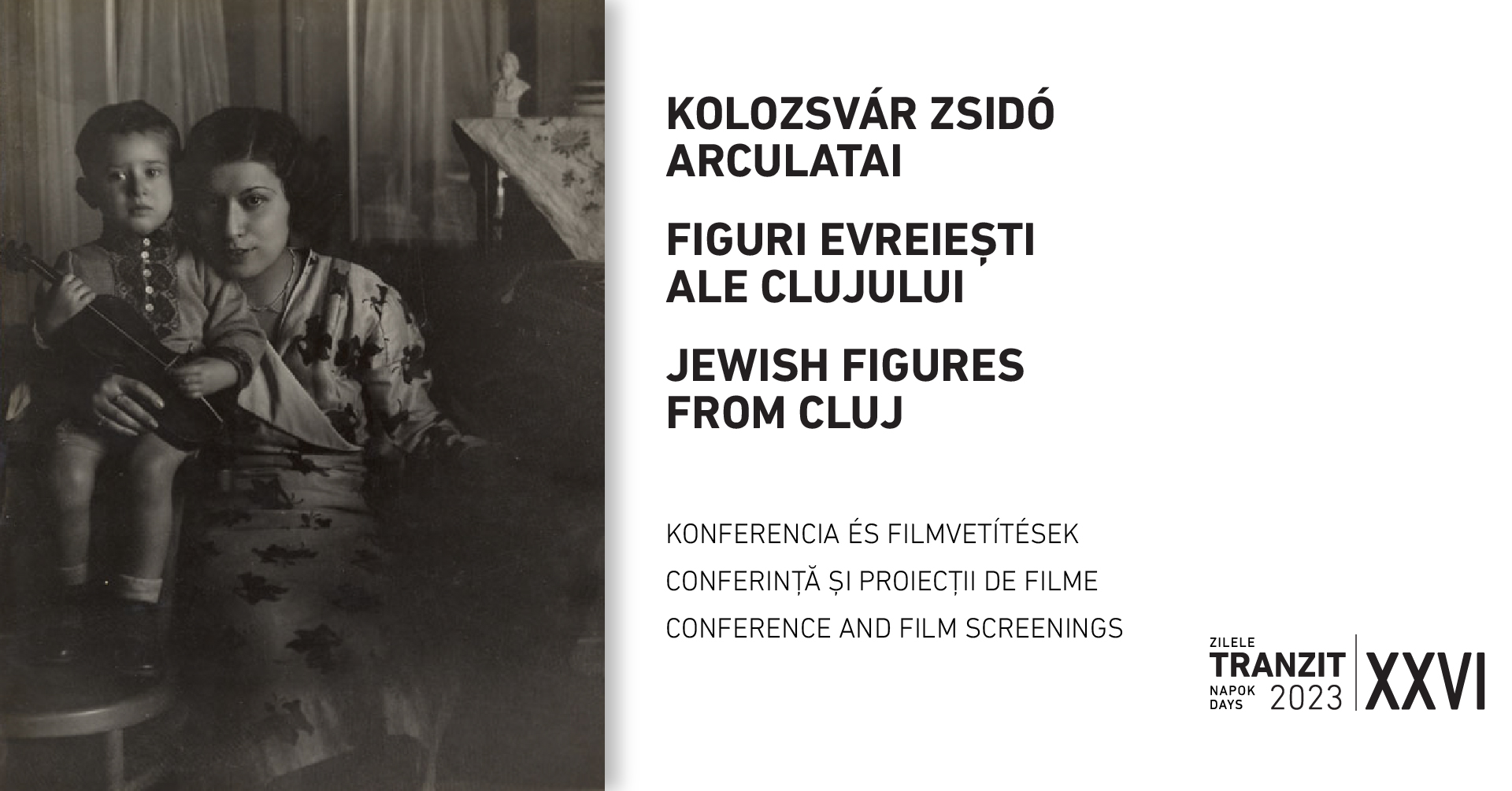Portrayals of the Jewish community of Cluj, Jewish figures from Cluj
conference — 30.10.2023 13:00According to the 1941 census data, 16,763 Israelis lived in Cluj. This number represented 13-15% of the total population of the city at the time. The Jews of Cluj are extremely important to us not only through their numerical ratio, but also through their contribution to the spiritual, economic and architectural achievements of the city. The invitees of the conference, intellectuals, historians, writers, filmmakers from Cluj, revive and interpret the Jewish aspects of Cluj and the careers of prominent Jewish personalities of the city in the historical contexts of the era.
The conference will be held in Hungarian and Romanian with simultaneous translation into Hungarian, Romanian and English
The program will be live streamed on the Facebook of Tranzit House.
PROGRAM
15:00 – 16:45 // Films in memory of Egon Lövith, László Nuszbaum and Róbert Schwartz:
Alin Gelmărean – Andrea Ghiță – Vig Emese: Portrait of Egon Marc Lövith, from the cycle ArTdelenisme (In Hungarian and Romanian with Romanian subtitles), 2005, 26’
Andrea Ghiță: Schwartz Róbert, surviver child of the Holocaust (In Hungarian with Romanian subtitles), 2023, 26’
László Csibi: Nussbaum 95736 (In Hungarian with English subtitles), 2017, 52
17:00 – 18:30 // Jewish figures from Cluj
Participants: László Csibi film director, university lecturer; Andrea Ghiță journalist, TV producer; Andrei Zador C. engineer, local historian.
Moderator: Gidó Attila historian
19:00 – 20:30 // Portrayals of the Jewish community of Cluj in local history and literature
Participants: Dániel Löwy research chemist, university profesor, historian; Júlia Szilágyi writer, literary critics; Andrea Tompa writer, asociated professor
Moderator: Mihály Szilágyi Gál philosopher, university lecturer
Main organizer and host of the conference: Csilla Könczei, cultural researcher, associate professor.
CONFERENCE PARTICIPANTS:
László CSIBI is an editor, cinematographer, director of several documentaries and video clips, university lecturer and head of the The Hungarian Department of Cinema and Media at the Faculty of Theatre and Film of Babeș-Bolyai University.
Andrea-Julika GHIȚĂ graduated from the Faculty of Physics. She is an informatician, from 1977 to 1992 she activated as a university lecturer, from 1992 to the present as a television journalist, she started and promoted the programs Shalom and Transilvania Policromă of the TVR Cluj and TVR3. She is a founding editor-in-chief of Baabel Magazine, and translator of several historical and literary books.
Attila GIDÓ is a historian, researcher at the Romanian Institute for Research National Minorities (ISPMN). His research focuses on the history of the Jews and Roma in Transylvania in the 20th century, especially on the period between the two world wars and the Holocaust. He published a book on the history of the Jews of Cluj between 1918 and 1940, and in his latest book he has published a list of names of Jewish persons who survived the deportations in northern Transylvania and returned home in 1945-1946.
LÖWY Dániel is a chemist, senior research fellow, scientific director, university professor, local historian. His cultural history studies, academic writings, essays and professional interviews have been published in journals and yearbooks in Romania, Hungary, USA and Canada. The results of his research on the Jews of Cluj and the Holocaust have been published in several volumes: A téglagyártól a tehervonatig (From de brick factory to the train of death) in 1998, A Kálváriától a tragédiáig. Kolozsvár zsidó lakosságának története (From Calvary to the Tragedy. The History of the Jewish population of Cluj) in 2005. As author or co-author, he contributed to six chapters of The Geographical Encyclopaedia of the Holocaust in Hungary, edited by Randolph L. Braham, published in 2007. His book of interviews and documentaries with contemporary witnesses of the Second World War, Sárga csillag Kolozsváron. Kortanúk emlékezései (Yellow Star in Cluj. Memories of Witnesses) was published by Koinónia Book Publishing House in Cluj-Napoca in 2017.
Júlia SZILÁGYI is an essayist and literary critic. She worked for Dolgozó Nő (Working Women) between 1963-1967 and Korunk (Our times) between 1969-1991. From 1994 to 2006 she was an invited lecturer at the Invisible College of the Department of Hungarian Literature at the BBU. She has received several awards for her work. She published numerous essays and volumes. Her most recent book, Olvasott idők (The Times We Read), was published in 2022 by Bookart-Kalligram.
Mihály SZILÁGYI-GÁL is a lecturer at the Institute for Art Theory and Media Research at ELTE Budapest. His selected publications are: „Apoliticism”. Philosophy and Global Affairs Review Vol. 3. Issue 1., 2023, The chances of misunderstanding. Philosophy, Political Theory and Rhetoric. Budapest: Gondolat Kiadó, 2018; Hannah Arendt and Friedrich Schiller on Kant’s Aesthetics: The Public Character of the Beautiful, Frankfurt am Main: Peter Lang Edition, 2017.
Andrea TOMPA is a writer. Her latest novel, Sokszor nem halunk meg (Often we don’t die), begins in the spring of 1944 and tells the story of a little baby of Jewish origin. The author has published several articles on Holocaust remembrance and staging.
ZADOR C. Andrei is an engineer by profession, having worked at the Tehnofrig factory for more than four decades. Since his retirement he has been working on the history of the Jews of Cluj. He recalls the memories of prominent personalities, rabbis, community leaders, university professors and businessmen. Lately, he has contributed to the understanding of the impact the Jewish community had on the economic development of Cluj in industry, small business, commerce, urban planning and architecture. This is the subject of his recent book, Prezențe evreiești în Clujul de altădată (Jewish Presence of Cluj in the Old Days), published by Mega editing house.
The conference is part of the Tranzit Days - Retrospective XXVI segment, co-financed by the Department for Interethnic Relations.
You can support Tranzit House on the Patreon platform:
https://www.patreon.com/TranzitHouse. Every contribution and gesture of solidarity is very
important to us!
